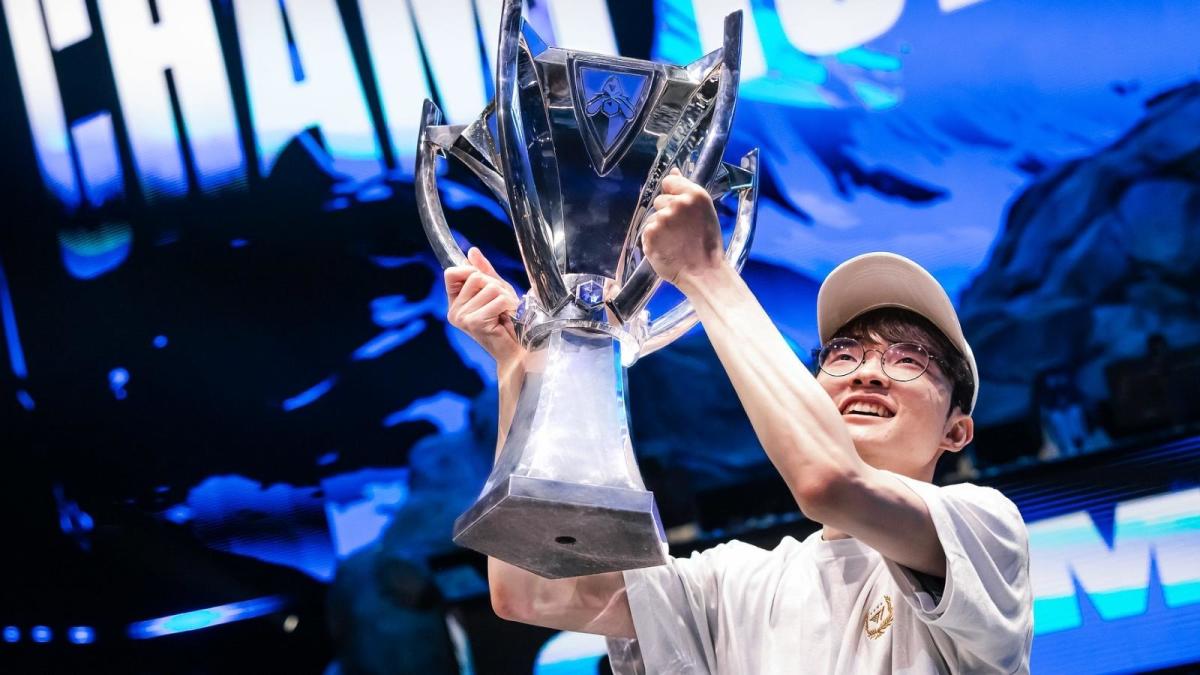Being proclaimed the G.O.A.T. (Greatest of All Time) in any industry, game, or discipline is more than just about securing continuous wins. It also exemplifies the trials, sacrifices, and struggles of a legend, as well as the support system surrounding him.
Such is the story for Lee “Faker” Sang-hyeok, the G.O.A.T. of League of Legends (LoL). Following a 3-0 triumph over Weibo Gaming in the 2023 LoL World Championship Grand Finals, Faker hoisted his fourth Summoner’s Cup, further extending his already impressive list of game achievements.
Origins of Humility
Faker developed an interest in LoL shortly after its 2011 debut in South Korea. Skinner shared that he started playing upon learning that LoL was releasing in Korea during an interview in the LoL Worlds 2023 Finals Teaser.
His rapid skill acquisition caught the attention of SK Telecom T1 K. As a teenager at that time, Faker discussed this development with his father, Lee Kyung-jun, who recalled their conversation during an ESPN interview four years ago.
Kyun-jun, expressing the temporary confusion he felt, approved of Faker’s proposal after a month of contemplation, recognising Faker’s sincerity. He promised to support his son’s ambition.
After a month, I asked Faker, ‘Is this still what you want?’ When he confirmed, I encouraged him to work hard and avoid losses,” recalled Kyun-jun.
Early achievements
Faker originally played as “GoJeonPa” before becoming the mid laner for SK Telecom T1 K and eventually adopting his signature in-game name.
His first televised match in Seoul on April 6, 2013, marked his professional debut. With a stunning performance, he won the solo kill against Kang “Ambition” Chan-yong, who was a mid laner for the All-Star team.
This signaled the beginning of one of esports’ most illustrious careers, with everyone acknowledging Faker’s unique talent.
Faker got the national championship with SK Telecom T1 in his first year as a professional player. At 17, he went on to Los Angeles and became a world champion.
Between 2013 and 2017, Faker claimed three World titles (2013, 2015, 2016) and two Mid-Season Invitational titles (2016, 2017), and earned the nickname “The Undying Demon King” for his mastery of the game.
Up until 2022, Faker and T1 secured ten national championships, including a flawless split in Spring 2022, and numerous individual awards, such as MVPs in domestic leagues and world finals.
LoL pre and post-Faker
Faker revolutionised the LoL scene through his unmatched skills, tactical genius, and consistent dominance. As SK Telecom T1’s mid laner, his creative game plans and impressive gameplay set new standards in the industry.
He accelerated the progress of professional play with his innovative moves using characters like Zed, Azir, Orianna, Akali, and LeBlanc. His gameplays lead to numerous new strategies in LoL Esports.
Challenges and Heartbreaks
Faker experienced a rude awakening in 2017 at the Beijing National Stadium when Samsung constantly outsmarted SKT. The Samsung team kept Faker under control, forcing other SKT members to step up their game.
Despite a potential comeback, a crucial play saw Faker getting caught out, leading to a 3-0 win for Samsung and shattering Faker’s hopes for his fourth world title.
As confetti rained down on the victorious Samsung team amidst cheers, Faker shed tears at the collapse of his fourth world title dream.
Faker and T1 have faced challenges since then, including changes in roster and Faker getting benched. Despite these trouble times, international success continued to elude them, including missing Worlds 2018, which was oddly enough hosted in South Korea.
However, Faker stayed committed to T1 throughout these challenging times and continued to adapt as the team’s rosters changed over the years.
The mentorship role
The 2021 season witnessed some significant changes as the main roster of T1 welcomed three T1 Academy members and another player from outside T1.
T1 homegrown talents Choi “Zeus” Woo-je, Mun “Oner” Hyeon-jun, and Lee “Gumayusi” Min-hyeong, were all ready to prove their worth. Alongside them was Ryu “Keria” Min-seok, a promising support player who previously played for DRX.
Faker transiting from depending solely on him and being the team’s focal point to becoming the enabler of the team’s success. He was a mentor and an elder brother figure fostering a strong bond within the team.
In Spring 2022, the newly assembled team achieved the remarkable feat of completing a perfect split.
